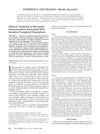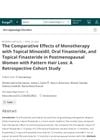 9 citations,
November 2008 in “Journal of Womens Health”
9 citations,
November 2008 in “Journal of Womens Health” Researchers had trouble finding enough participants for a trial on DHEA's effects on postmenopausal women's sexual desire.
 September 2019 in “Journal of Investigative Dermatology”
September 2019 in “Journal of Investigative Dermatology” Abrocitinib at 100 mg and 200 mg daily may significantly improve moderate-to-severe atopic dermatitis in patients 12 years and older.
 January 1989 in “Clinical and Experimental Dermatology”
January 1989 in “Clinical and Experimental Dermatology” The symposium concluded that hair growth involves complex processes, including the hair follicle life cycle, the role of the dermal papilla, hair strength, pigmentation, and the impact of diseases and treatments like minoxidil on hair and skin.
 November 2024 in “SKIN The Journal of Cutaneous Medicine”
November 2024 in “SKIN The Journal of Cutaneous Medicine” The gummy improved hair growth and reduced shedding in women.
 August 2023 in “The American Journal of Medicine”
August 2023 in “The American Journal of Medicine” A young woman with lupus was treated with hydroxychloroquine and prednisone.
 26 citations,
March 2003 in “Pediatrics”
26 citations,
March 2003 in “Pediatrics” Oral steroids may effectively treat recurrent intussusception in children with ILH, possibly avoiding surgery.
 October 2023 in “Siriraj Medical Journal”
October 2023 in “Siriraj Medical Journal” Taking iron pills does not improve hair loss treatment in women with low iron compared to using minoxidil alone.
1 citations,
March 1995 in “Pharmacoepidemiology and drug safety” Taking oral contraceptives while on isotretinoin may increase the risk of high triglyceride and cholesterol levels.
 April 2024 in “International Journal of Dermatology”
April 2024 in “International Journal of Dermatology” Oral minoxidil may worsen hangover symptoms when combined with alcohol.
March 2023 in “Journal of Cosmetic Dermatology” Low-dose oral minoxidil improved hair growth when topical treatments failed.
June 2022 in “Dermatologic Therapy” Oral minoxidil and growth factors improved hair density and thickness in a girl with hereditary hair loss.
 5 citations,
March 2014 in “Journal of The American Academy of Dermatology”
5 citations,
March 2014 in “Journal of The American Academy of Dermatology” The study suggests hormonal factors may play a role in Frontal Fibrosing Alopecia and that treatments like oral antiandrogens and steroids could be beneficial.
 1 citations,
June 2022 in “JAMA”
1 citations,
June 2022 in “JAMA” Baricitinib, a medication taken by mouth, was effective in regrowing hair for people with severe hair loss.
 December 2023 in “Journal of Drugs in Dermatology”
December 2023 in “Journal of Drugs in Dermatology” Media coverage increased public interest in oral minoxidil for hair loss but may also spread misinformation.
 December 2023 in “Current Dermatology Reports”
December 2023 in “Current Dermatology Reports” Oral minoxidil is a potential treatment for hair loss.
 September 2023 in “Journal of The American Academy of Dermatology”
September 2023 in “Journal of The American Academy of Dermatology” Low-dose oral minoxidil may be effective for hair loss treatment.
 January 2023 in “Applied sciences”
January 2023 in “Applied sciences” Gefitinib and Sasam-Kyeongokgo together significantly reduce cancer growth and improve immune response in mice.
 December 2022 in “Türk biyokimya dergisi”
December 2022 in “Türk biyokimya dergisi” The conclusions are: fecal short-chain fatty acids may help prevent cancer, fiber intake can reduce obesity, weight loss is hard for obese people, low BMI cancer patients are more prone to chemotherapy side effects, intermittent fasting benefits gut health, cherry laurel has health benefits in rats, certain gene variations can increase stress in hair loss patients, fecal acids can affect blood sugar levels, cold agglutinin can affect blood test results in autoimmune patients, and people with Crohn's disease have higher levels of a certain chemical in their blood.
August 2022 in “International Journal of Health Sciences (IJHS)” The combined treatment significantly improved hair growth and thickness compared to the control group.
 29 citations,
November 2012 in “Journal of The European Academy of Dermatology and Venereology”
29 citations,
November 2012 in “Journal of The European Academy of Dermatology and Venereology” Use 5% minoxidil or oral finasteride for mild-to-moderate hair loss, combine with hair transplant for severe cases.
28 citations,
July 2015 in “Dermatologic therapy” The combined therapy was effective and safe for children with severe alopecia areata.
19 citations,
May 2009 in “Pediatric Dermatology” A 5-year-old girl's scalp scarring and hair loss from lupus improved with specific medications.
 17 citations,
August 2015 in “Expert Opinion on Pharmacotherapy”
17 citations,
August 2015 in “Expert Opinion on Pharmacotherapy” The document concludes that oral finasteride and topical minoxidil are effective for genetic hair loss, while other treatments for different types of hair loss show promise but need more research.
 7 citations,
August 2020 in “Scientifica”
7 citations,
August 2020 in “Scientifica” Most HIV-positive patients had skin problems, and conditions like oral thrush and boils were linked to weaker immune systems.
5 citations,
September 2021 in “Dermatologic Therapy” Oral minoxidil effectively treats female pattern hair loss and is a good alternative to topical minoxidil.
2 citations,
December 2023 in “Pharmaceutics” Inhaling medicine may reduce side effects and improve treatment for a major lung cancer type.
 2 citations,
February 2023 in “BJUI”
2 citations,
February 2023 in “BJUI” Urologists should monitor mental health in patients taking finasteride due to potential links to suicidal thoughts, adjusting dosage or stopping use if necessary. More research is needed to confirm if finasteride causes these thoughts.
2 citations,
March 2022 in “Journal of The European Academy of Dermatology and Venereology” Combining dutasteride injections with oral minoxidil may improve hair regrowth more than using oral minoxidil alone.
1 citations,
January 2021 in “Journal of dermatology & dermatologic surgery” Oral isotretinoin does not cause milia in acne patients.
 April 2024 in “Skin appendage disorders”
April 2024 in “Skin appendage disorders” Oral finasteride seems more effective for hair loss in postmenopausal women, but more research is needed.



















